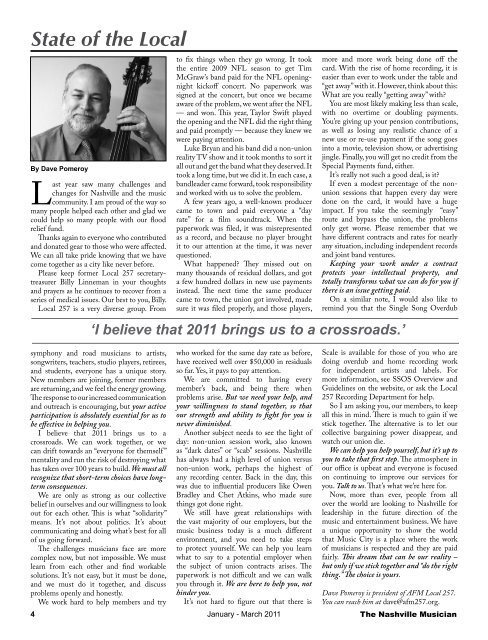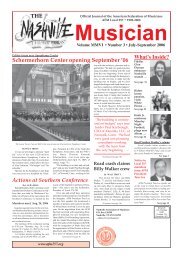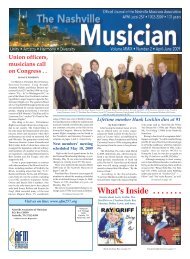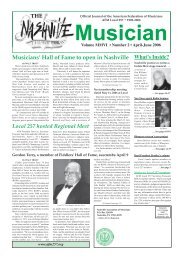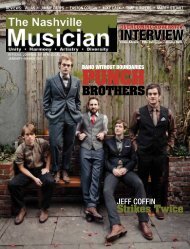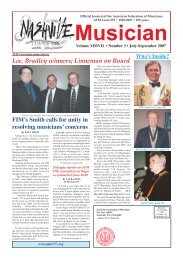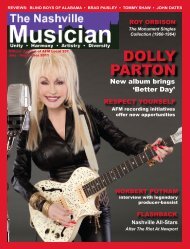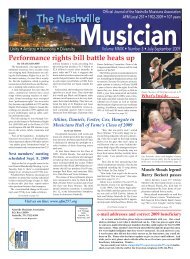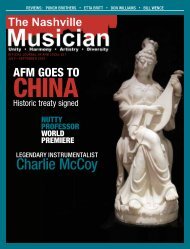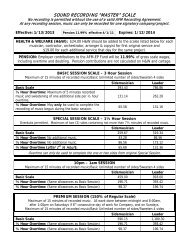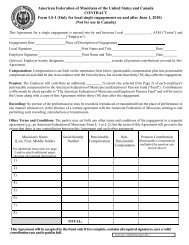DUANE EDDY - Nashville Musicians Association
DUANE EDDY - Nashville Musicians Association
DUANE EDDY - Nashville Musicians Association
Create successful ePaper yourself
Turn your PDF publications into a flip-book with our unique Google optimized e-Paper software.
State of the Local<br />
By Dave Pomeroy<br />
Last year saw many challenges and<br />
changes for <strong>Nashville</strong> and the music<br />
community. I am proud of the way so<br />
many people helped each other and glad we<br />
could help so many people with our flood<br />
relief fund.<br />
Thanks again to everyone who contributed<br />
and donated gear to those who were affected.<br />
We can all take pride knowing that we have<br />
come together as a city like never before.<br />
Please keep former Local 257 secretarytreasurer<br />
Billy Linneman in your thoughts<br />
and prayers as he continues to recover from a<br />
series of medical issues. Our best to you, Billy.<br />
Local 257 is a very diverse group. From<br />
symphony and road musicians to artists,<br />
songwriters, teachers, studio players, retirees,<br />
and students, everyone has a unique story.<br />
New members are joining, former members<br />
are returning, and we feel the energy growing.<br />
The response to our increased communication<br />
and outreach is encouraging, but your active<br />
participation is absolutely essential for us to<br />
be effective in helping you.<br />
I believe that 2011 brings us to a<br />
crossroads. We can work together, or we<br />
can drift towards an “everyone for themself ”<br />
mentality and run the risk of destroying what<br />
has taken over 100 years to build. We must all<br />
recognize that short-term choices have longterm<br />
consequences.<br />
We are only as strong as our collective<br />
belief in ourselves and our willingness to look<br />
out for each other. This is what “solidarity”<br />
means. It’s not about politics. It’s about<br />
communicating and doing what’s best for all<br />
of us going forward.<br />
The challenges musicians face are more<br />
complex now, but not impossible. We must<br />
learn from each other and find workable<br />
solutions. It’s not easy, but it must be done,<br />
and we must do it together, and discuss<br />
problems openly and honestly.<br />
We work hard to help members and try<br />
to fix things when they go wrong. It took<br />
the entire 2009 NFL season to get Tim<br />
McGraw’s band paid for the NFL openingnight<br />
kickoff concert. No paperwork was<br />
signed at the concert, but once we became<br />
aware of the problem, we went after the NFL<br />
— and won. This year, Taylor Swift played<br />
the opening and the NFL did the right thing<br />
and paid promptly — because they knew we<br />
were paying attention.<br />
Luke Bryan and his band did a non-union<br />
reality TV show and it took months to sort it<br />
all out and get the band what they deserved. It<br />
took a long time, but we did it. In each case, a<br />
bandleader came forward, took responsibility<br />
and worked with us to solve the problem.<br />
A few years ago, a well-known producer<br />
came to town and paid everyone a “day<br />
rate” for a film soundtrack. When the<br />
paperwork was filed, it was misrepresented<br />
as a record, and because no player brought<br />
it to our attention at the time, it was never<br />
questioned.<br />
What happened? They missed out on<br />
many thousands of residual dollars, and got<br />
a few hundred dollars in new use payments<br />
instead. The next time the same producer<br />
came to town, the union got involved, made<br />
sure it was filed properly, and those players,<br />
who worked for the same day rate as before,<br />
have received well over $50,000 in residuals<br />
so far. Yes, it pays to pay attention.<br />
We are committed to having every<br />
member’s back, and being there when<br />
problems arise. But we need your help, and<br />
your willingness to stand together, so that<br />
our strength and ability to fight for you is<br />
never diminished.<br />
Another subject needs to see the light of<br />
day: non-union session work, also known<br />
as “dark dates” or “scab” sessions. <strong>Nashville</strong><br />
has always had a high level of union versus<br />
non-union work, perhaps the highest of<br />
any recording center. Back in the day, this<br />
was due to influential producers like Owen<br />
Bradley and Chet Atkins, who made sure<br />
things got done right.<br />
We still have great relationships with<br />
the vast majority of our employers, but the<br />
music business today is a much different<br />
environment, and you need to take steps<br />
to protect yourself. We can help you learn<br />
what to say to a potential employer when<br />
the subject of union contracts arises. The<br />
paperwork is not difficult and we can walk<br />
you through it. We are here to help you, not<br />
hinder you.<br />
It’s not hard to figure out that there is<br />
more and more work being done off the<br />
card. With the rise of home recording, it is<br />
easier than ever to work under the table and<br />
“get away” with it. However, think about this:<br />
What are you really “getting away” with?<br />
You are most likely making less than scale,<br />
with no overtime or doubling payments.<br />
You’re giving up your pension contributions,<br />
as well as losing any realistic chance of a<br />
new use or re-use payment if the song goes<br />
into a movie, television show, or advertising<br />
jingle. Finally, you will get no credit from the<br />
Special Payments fund, either.<br />
It’s really not such a good deal, is it?<br />
If even a modest percentage of the nonunion<br />
sessions that happen every day were<br />
done on the card, it would have a huge<br />
impact. If you take the seemingly “easy”<br />
route and bypass the union, the problems<br />
only get worse. Please remember that we<br />
have different contracts and rates for nearly<br />
any situation, including independent records<br />
and joint band ventures.<br />
Keeping your work under a contract<br />
protects your intellectual property, and<br />
totally transforms what we can do for you if<br />
there is an issue getting paid.<br />
On a similar note, I would also like to<br />
remind you that the Single Song Overdub<br />
‘I believe that 2011 brings us to a crossroads.’<br />
Scale is available for those of you who are<br />
doing overdub and home recording work<br />
for independent artists and labels. For<br />
more information, see SSOS Overview and<br />
Guidelines on the website, or ask the Local<br />
257 Recording Department for help.<br />
So I am asking you, our members, to keep<br />
all this in mind. There is much to gain if we<br />
stick together. The alternative is to let our<br />
collective bargaining power disappear, and<br />
watch our union die.<br />
We can help you help yourself, but it’s up to<br />
you to take that first step. The atmosphere in<br />
our office is upbeat and everyone is focused<br />
on continuing to improve our services for<br />
you. Talk to us. That’s what we’re here for.<br />
Now, more than ever, people from all<br />
over the world are looking to <strong>Nashville</strong> for<br />
leadership in the future direction of the<br />
music and entertainment business. We have<br />
a unique opportunity to show the world<br />
that Music City is a place where the work<br />
of musicians is respected and they are paid<br />
fairly. This dream that can be our reality –<br />
but only if we stick together and “do the right<br />
thing.” The choice is yours.<br />
Dave Pomeroy is president of AFM Local 257.<br />
You can reach him at dave@afm257.org.<br />
4 January - March 2011<br />
The <strong>Nashville</strong> Musician


